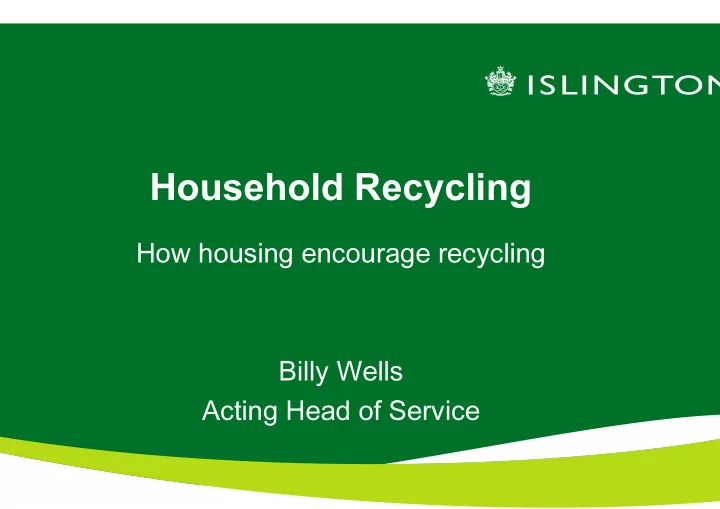

Household Recycling How housing encourage recycling Billy Wells Acting Head of Service
Introduction • Housing part fund Environment and Regeneration to collect recycling from our estates. • This helps fund the recycling team in Environment and Regeneration part of whose role is to encourage council house residents to recycle. • Where low recycling rates are found by the team they hold public meetings, leaflet and write to residents and agree ways of improving it with housing officers in the Area Housing Office Estates Service Teams.
Estates Services Structure • Each of the three Area Housing Offices, Upper St, Holland Walk and St John St. has an Estates Service Team with an Estates Services Manager • They manage a team of officers and caretakers who look after maintenance and cleanliness of the communal areas inside and outside the blocks Upper St Holland Walk St Johns St. ESCs 11 6 4 QAOs 5 3 2 Caretakers 113 50 43
To help the council achieve the 37% recycling target we agreed an action plan with the recycling team in 2016, as part of this housing; • Funded improvements to some recycling sites to make them more user friendly, including the erection of screens to a number of sites costing £25,000 • Encouraged caretakers to clear up any mess left around the sites • Encouraged estates services staff to meet with refuse and recycling managers to resolve any collection issues • Advise new residents at our 4 weekly visits on recycling arrangements for the estate • Have been in discussion with refuse and recycling in an attempt to identify the duties of the collection team and caretakers to help improve the condition of the sites
We have included the following abridged slide show for residents, produced by the recycling team, on our 120 plus digital noticeboards on our estates
� � � � � � � � What to put in your recycling bank You can recycle more than you think! Plastic tubs, yoghurt pots, plastic packaging Drinks and soup cartons All plastic bottles including drinks Cardboard boxes, corrugated card, greeting cards All paper including newspapers, magazines, catalogues, envelopes All glass bottle and jars Cans and tins for food, drink and pet food Clean foil and empty aerosol cans. For help or advice www.islington.gov.uk/recycling recycling@islington.gov.uk
What not to put in your recycling bank x Black bags – even if they contain recycling x Food or liquid x Textiles x Electrical items x Wood and rubble x Polystyrene x Household items, toys, crockery, broken glass x Foil lined packets, crisp packets and sweet wrappers x Crockery, light bulbs, glass sheets, batteries x Paint tins and other metal. For help or advice contact or call E: recycling@islington.gov.uk
Why can’t I use a black bag for recycling? Because your efforts might be wasted� • Black bags are used for rubbish and so the bin men put them in with the rubbish for landfill • Because they are busy collecting, they cannot sort through black bags. When black bags are put in the recycling bins we may have to throw the whole bin away. Don’t let your recycling go to waste. Put items in loose or use ordinary supermarket style bags. For help or advice contact or call E: recycling@islington.gov.uk T: 020 7527 2000
What happens to my recycling? • Your mixed recycling is taken to a Materials Recovery Facility (MRF). • At the MRF, the recycling goes into a huge spinning drum. Small items like bottles and cans drop through holes, leaving behind mostly paper and card. • The recycling moves along conveyor belts. Magnets separate steel cans from aluminium cans and high pressure jets of air separate plastic bottles. • The sorted recycling falls off the end of the last conveyor belt into storage bags. • The sorted materials are baled and sent off to be made into something new. • Recycled! • For help or advice contact or call
hy do we all need to recycle? Recycling means the money saved can be spent on important Islington services rather than on throwing away rubbish. Make sure you’re doing your bit! For help or advice contact or call recycling@islington.gov.uk 020 7527 2000
• The recycling team monitor contamination at the recycling sites and complete action plans to encourage more recycling • Housing arrange meetings for recycling to advise residents on better recycling • Housing distribute leaflets to residents for the recycling team • Housing have paid for two mobile cameras costing £20,000 located at recycling sites with contamination to try and identify what residents are doing wrong • Housing hold regular meetings with the recycling teams to see what can be done to improve recycling on any particular estate
Any Questions?
Recommend
More recommend